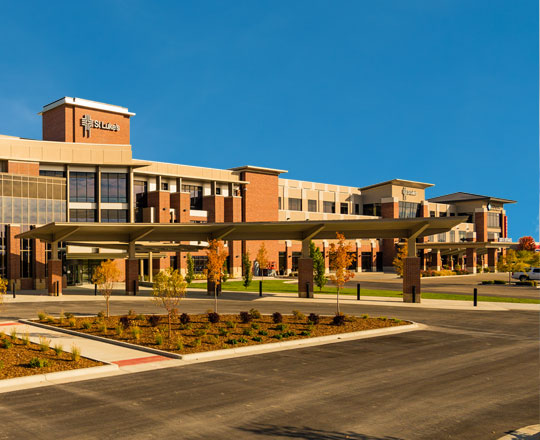COVID-19 news and updates
Some call St. Luke’s Nampa’s first COVID-19 patient a miracle

Life thrashed COVID-19 on Friday, April 10 when Chris Waters walked out of the Intensive Care Unit where she’d been on a ventilator for 14 days.
As she made her way to her new room, Waters, 66, was cheered by St. Luke’s Nampa staff who were elated to see the hospital’s first COVID-19 patient had survived. Waters went home on Saturday, April 11.
“These nurses and staff knew how to balance their compassion with their profession,” Waters said. “I’m sure I wouldn’t be here without them.”
On March 26, Waters was sitting home in Nampa and felt so sick she thought she might die – she called 911. She had already seen a few doctors and been diagnosed with a sinus infection, an ear infection and a urinary tract infection, but after four rounds of antibiotics, she was not getting well. When she went to a COVID-19 drive-up tent, they refused to take a specimen to test for the virus because she did not meet their criteria.
After the emergency medical technicians listened to her, they took her to St. Luke’s Nampa. On arrival, she was alert, but she quickly became unresponsive and was taken to ICU and put on a ventilator in an induced coma.
Staff, from the nurses and respiratory therapists to phlebotomists, worked hard, donning full protective gear each time they entered her room. Nurses spent hours caring for her, watching her numbers, suctioning her tubes constantly and making adjustments based on the pulmonologist’s orders.
“She was really struggling,” said nurse supervisor Losa Manuokafoa. “A week in, staff began to prepare themselves for her not to make it. But she stayed stable and then came out of it.”
Waters said she didn’t know what kind of trouble she was in, and it was difficult not being able to have any family members be with her due to the COVID-19 visitor restrictions. Waters has three sons and daughters-in-law and several grandchildren.
“I was sick, I couldn’t talk, I only had these young kids I didn’t know,” she said. “But they came whenever I called. The nurses were my lifeline. Through FaceTime on my phone, I introduced them to my kids. They explained things to my kids, let them look at my room and let them look at me. It was very comforting for my kids, for me.”
She said she felt incredibly loved by family and staff throughout this experience.
“I just want to make sure they all know how special they are, and I would not have made it without them,” Waters said. From the EMTs and firefighters to the St. Luke’s staff, “they work together so well. They just were very compassionate young people.”

Manuokafoa said her staff understand the impact of not having family members for support and that they are substitute family members as they care for patients and help them through these critical transitions. Many of the staff are even staying away from their own families so they don’t bring the virus home.
“It’s a pretty overwhelming thing,” she said. “I’m grateful they come back every day.”
After the ventilator tube was removed, Waters said she felt 100% better. The first thing they asked her to say was her name, and she didn’t stop talking all that day.
Waters, who is the head waitress at the iconic Stagecoach Inn in Garden City, has always been a strong, healthy person who prefers to do things for herself. “I’m just really stubborn,” she said.
So, when staff asked if they could take her by wheelchair to her new room, she said she’d walk. What she wasn’t prepared for was the staff lining the hallways and cheering for her.
“It was recognizing this was a success for everyone,” Manuokafoa said. “This is going to keep happening. I was just so proud of the staff that cheered her on.”
Waters said she has big plans for when she gets home. She’s going to hang her grandkids drawings and make a big 8-foot square in her front yard so she can talk to the family and the neighbors who come by – from a safe distance.
About The Author

Sandra Forester works in the Communications and Marketing department at St. Luke's.

